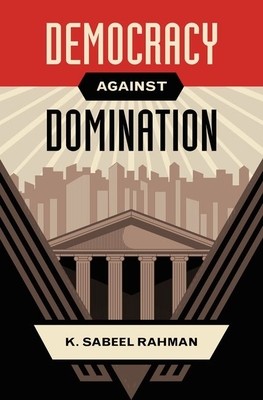
- We will send in 10–14 business days.
- Author: K Sabeel Rahman
- Publisher: Oxford University Press, USA
- ISBN-10: 019046853X
- ISBN-13: 9780190468538
- Format: 15.8 x 23.6 x 2.5 cm, kieti viršeliai
- Language: English
- SAVE -10% with code: EXTRA
Reviews
Description
The 2008 collapse of the US financial system plunged the economy into the worst economic downturn since the Great Depression, raising deep moral and institutional questions about the problems of economic inequality and economic power on the one hand, and the tensions between democracy and bureaucratic policymaking on the other. In Democracy Against Domination, K. Sabeel Rahman draws on a rich tradition of political economy rooted in the thought and reform politics of early twentieth-century progressives like John Dewey and Louis Brandeis to argue that, first, we should reconceive economic governance as focused not just on growth or efficiency but rather on counteracting the threat of domination whether in the form of corporate power or inequitable markets; and second, that we must do so by expanding the capacity of citizens themselves to exercise real political power in economic policymaking. Synthesizing a range of insights from law, history, political theory, and public
policy, Rahman combines a fresh normative approach to democratic theory and economic power with a concrete analysis of the institutions needed to realize urgent hopes for a more equitable and democratic economy.
EXTRA 10 % discount with code: EXTRA
The promotion ends in 21d.03:00:57
The discount code is valid when purchasing from 10 €. Discounts do not stack.
- Author: K Sabeel Rahman
- Publisher: Oxford University Press, USA
- ISBN-10: 019046853X
- ISBN-13: 9780190468538
- Format: 15.8 x 23.6 x 2.5 cm, kieti viršeliai
- Language: English English
The 2008 collapse of the US financial system plunged the economy into the worst economic downturn since the Great Depression, raising deep moral and institutional questions about the problems of economic inequality and economic power on the one hand, and the tensions between democracy and bureaucratic policymaking on the other. In Democracy Against Domination, K. Sabeel Rahman draws on a rich tradition of political economy rooted in the thought and reform politics of early twentieth-century progressives like John Dewey and Louis Brandeis to argue that, first, we should reconceive economic governance as focused not just on growth or efficiency but rather on counteracting the threat of domination whether in the form of corporate power or inequitable markets; and second, that we must do so by expanding the capacity of citizens themselves to exercise real political power in economic policymaking. Synthesizing a range of insights from law, history, political theory, and public
policy, Rahman combines a fresh normative approach to democratic theory and economic power with a concrete analysis of the institutions needed to realize urgent hopes for a more equitable and democratic economy.


Reviews